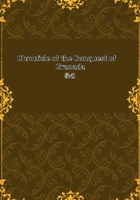
第55章
In the midst of the bustle of warlike affairs the worthy chronicler Fray Antonio Agapida pauses to note, with curious accuracy, the distinguished reception given to the count de Cabra and his nephew, the alcayde de los Donceles, at the stately and ceremonious court of the Castilian sovereigns, in reward for the capture of the Moorish king Boabdil. The court (he observes) was held at the time in the ancient Moorish palace of the city of Cordova, and the ceremonials were arranged by that venerable prelate Don Pedro Gonzales de Mendoza, bishop of Toledo and grand cardinal of Spain.
It was on Wednesday, the 14th of October (continues the precise Antonio Agapida), that the good count de Cabra, according to arrangement, appeared at the gate of Cordova. Here he was met by the grand cardinal and the duke of Villahermosa, illegitimate brother of the king, together with many of the first grandees and prelates of the kingdom. By this august train was he attended to the palace amidst strains of martial music and the shouts of a prodigious multitude.
When the count arrived in the presence of the sovereigns, who were seated in state on a dais or raised part of the hall of audience, they both arose. The king advanced exactly five steps toward the count, who knelt and kissed his royal hand; however, the king would not receive him as a mere vassal, but embraced him with affectionate cordiality. The queen also advanced two steps, and received the count with a countenance full of sweetness and benignity: after he had kissed her hand the king and queen returned to their thrones, and, cushions being brought, they ordered the count de Cabra to be seated in their presence. This last circumstance is written in large letters and followed by several notes of admiration in the manuscript of the worthy Fray Antonio Agapida, who considers the extraordinary privilege of sitting in presence of the Catholic sovereigns an honor well worth fighting for.
The good count took his seat at a short distance from the king, and near him was seated the duke of Najera, then the bishop of Palencia, then the count of Aguilar, the count Luna, and Don Gutierre de Cardenas, senior commander of Leon.
On the side of the queen were seated the grand cardinal of Spain, the duke of Villahermosa, the count of Monte Rey, and the bishops of Jaen and Cuenca, each in the order in which they are named. The infanta Isabella was prevented by indisposition from attending the ceremony.
And now festive music resounded through the hall, and twenty ladies of the queen's retinue entered, magnificently attired; upon which twenty youthful cavaliers, very gay and galliard in their array, stepped forth, and, each seeking his fair partner, they commenced a stately dance. The court in the mean time (observes Fray Antonio Agapida) looked on with lofty and becoming gravity.
When the dance was concluded the king and queen rose to retire to supper, and dismissed the count with many gracious expressions. He was then attended by all the grandees present to the palace of the grand cardinal, where they partook of a sumptuous banquet.